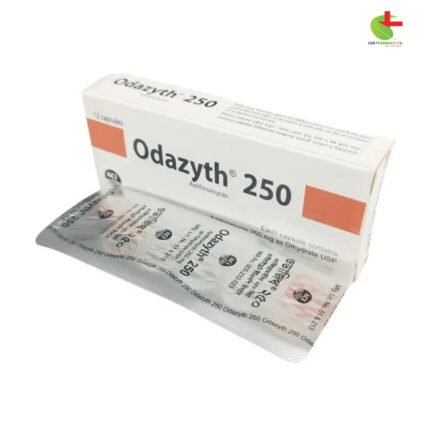Abaclor 500
241.62৳ Strip
- Abaclor (Cefaclor) is a second-generation cephalosporin antibiotic.
- Treats respiratory, skin, and urinary tract infections caused by common bacteria like Streptococcus pneumoniae, Escherichia coli, and Staphylococcus aureus.
- Available in capsule, suspension, and pediatric drops for both adults and children.
- Follow healthcare provider’s instructions for safe and effective use.
 Brand
Brand
|
ACI Limited |
|---|---|
 Generics
Generics
|
Cefaclor Monohydrate |
 Type
Type
|
Capsule |
0
People watching this product now!
Category: Medicine
Tags: Abaclor, affordable antibiotics, antibiotic for pneumonia, antibiotic treatment, bacterial infections, buy Abaclor online, Buy antibiotics online, Cefaclor, cefaclor price, Incepta Pharmaceuticals, Live Pharmacy, Pediatric Antibiotic, respiratory tract infection, second-generation antibiotic, skin infection, Urinary Tract Infection
Description
Indications
Abaclor is indicated for the treatment of various bacterial infections, including:
- Respiratory tract infections: Pneumonia, bronchitis caused by Streptococcus pneumoniae, Haemophilus influenzae, and Streptococcus pyogenes.
- Otitis media: Caused by Streptococcus pneumoniae, Haemophilus influenzae, Staphylococcus aureus, and Streptococcus pyogenes.
- Pharyngitis & Tonsillitis: Caused by Streptococcus pyogenes.
- Urinary tract infections: Including pyelonephritis and cystitis caused by Escherichia coli, Proteus mirabilis, Klebsiella spp., and coagulase-negative Staphylococci.
- Skin and soft tissue infections: Caused by Staphylococcus aureus and Streptococcus pyogenes.
Always follow the prescription and guidelines provided by your healthcare provider.
Pharmacology
Abaclor (Cefaclor) is a second-generation cephalosporin antibiotic with a broad spectrum of activity. It is stable against beta-lactamase inactivation and is effective against several organisms, including:
- Streptococci (alpha and beta-hemolytic)
- Staphylococcus aureus (including penicillinase-producing strains)
- Streptococcus pneumoniae, Streptococcus pyogenes, and Haemophilus influenzae
- Escherichia coli, Proteus mirabilis, Klebsiella spp.
It effectively eradicates Streptococcus from the nasopharynx and is used for various bacterial infections.
Dosage & Administration
- Adults: Typically 250 mg every 8 hours. For severe infections, the dose may be increased to 500 mg every 8 hours (maximum 4 g/day). For β-hemolytic Streptococcal infections, a 10-day course is recommended.
- Pediatric (over 1 month): Standard dosage is 20 mg/kg/day in divided doses. For serious infections, the dose may increase to 40 mg/kg/day.
Powder for Suspension & Pediatric Drops:
- <1 year (9 kg): ½ tsp (suspension) or 0.625 ml (drops) three times a day.
- 1-5 years: 1 tsp (suspension) or 1.25 ml (drops) three times a day.
- >5 years: 2 tsp (suspension) three times a day.
For renal impairment and patients on hemodialysis, specific dosing adjustments are required.
Interaction
- Anticoagulants: Co-administration with Warfarin may enhance its anticoagulant effects, necessitating regular monitoring of prothrombin time.
- False Positive Glucose: Abaclor may cause false-positive results in glucose urine tests (using Benedict’s or Fehling’s solution).
Contraindications
- Hypersensitivity: Contraindicated in patients with known allergies to cephalosporin antibiotics or penicillin.
Side Effects
- Common: Diarrhea, nausea, and vomiting.
- Less common: Liver dysfunction (elevated enzymes), superinfection, renal issues, and, rarely, allergic reactions like rash and fever.
- Severe: Rare reports of toxic nephropathy, pancytopenia, and cholestatic jaundice.
Pregnancy & Lactation
- Pregnancy: Category B. Cefaclor has shown no harm to the fetus in animal studies, but should be used in pregnancy only when clearly needed.
- Lactation: Cefaclor is excreted in breast milk in small amounts. Exercise caution when used by nursing mothers.
Precautions & Warnings
- Superinfection: Prolonged use may lead to the overgrowth of non-susceptible organisms.
- Allergies: Caution is advised when administering to patients with a history of drug allergies, particularly to penicillin.
- Gastrointestinal Disease: Use with caution in patients with a history of gastrointestinal issues such as colitis.
Overdose Effects
- Symptoms of overdose may include nausea, vomiting, and diarrhea. In such cases, symptomatic treatment is recommended.
Storage
- Store Abaclor at room temperature, away from light and heat. Once reconstituted, the suspension is stable for 7 days at room temperature and 14 days in the refrigerator (2-8°C).
Reviews (0)
Be the first to review “Abaclor 500” Cancel reply
About brand
Shipping & Delivery













Reviews
There are no reviews yet.